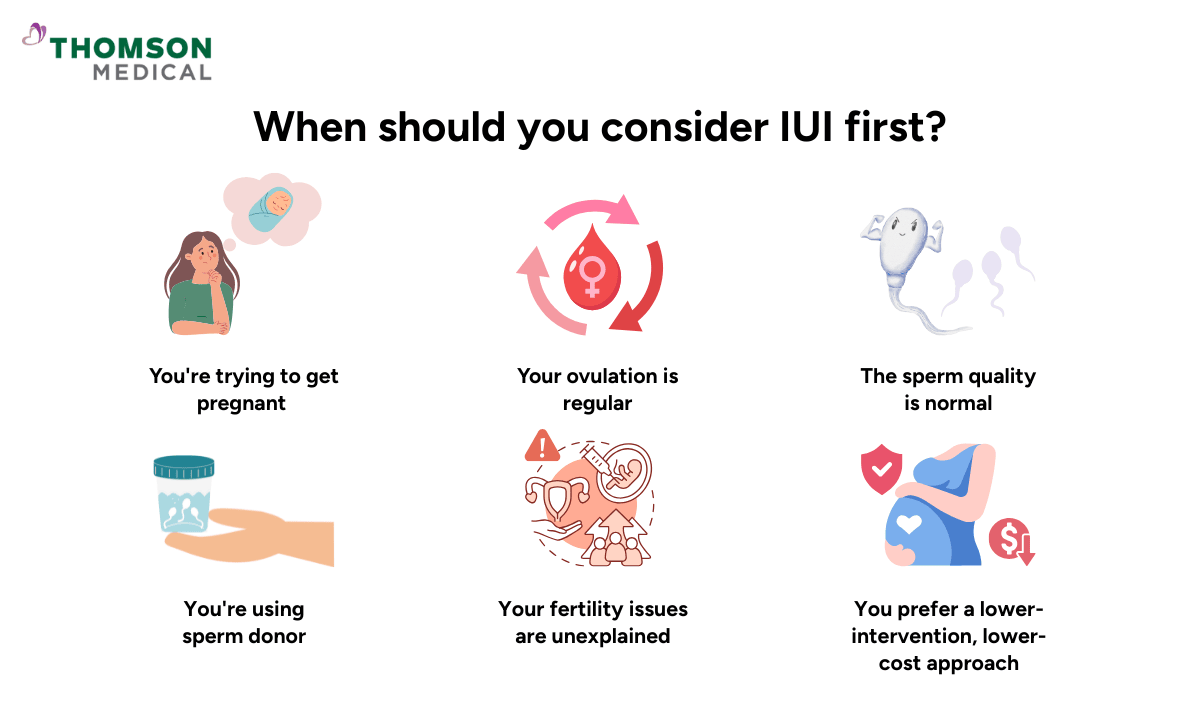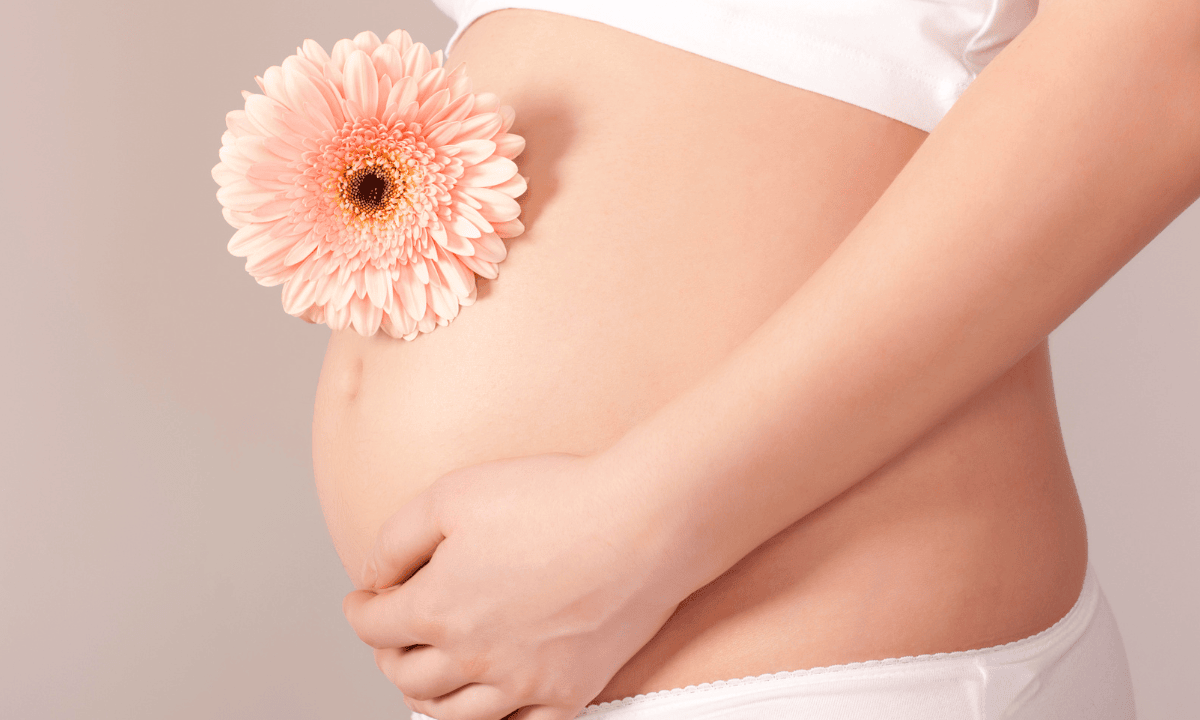When you and your partner are exploring fertility treatments, you may come across two common approaches: IUI and SO-IUI.
If you’re feeling unsure about which treatment is right for you, you’re not alone – many other couples face the same dilemma. While both of these treatments can help you get pregnant, they work in different ways. Let’s take a closer look at how SO-IUI and IUI work, what makes them different, and which approach might be the best fit for your situation.
What Is IUI?
Intrauterine Insemination (IUI) is a fertility procedure where prepared sperm are inserted directly into the uterus (womb) during ovulation. This artificial insemination treatment helps bring sperm closer to the egg, increasing the chance of getting pregnant.
The IUI procedure is usually performed as a gentle first step before considering more advanced fertility treatment. It works with your natural cycle (without medication) or with minimal ovulation tracking and is best for couples with mild male factor infertility, unexplained infertility, or those using a sperm donor.
What is SO-IUI?
Superovulation with Intrauterine Insemination (SO-IUI) is also called superovulation IUI, stimulated IUI, or medicated IUI. This treatment uses the same insemination procedure as IUI, but fertility medications are added to stimulate your ovaries to release more than one egg. The goal is to improve fertilisation chances by increasing the number of eggs available.
Key differences between IUI and SO-IUI
Knowing how IUI and SO-IUI differ can help you decide which procedure might work better for your situation.
These are the key differences between them:
Feature | IUI (Natural or Minimal Stimulation) | SO-IUI (Stimulated) |
Use of medications | None or mild (e.g., Letrozole/Clomid) | Yes, medications are used to stimulate multiple follicles |
Eggs released | Typically 1 | 2–3 (ideally), depending on your body’s response |
Monitoring | Basic or minimal | Intensive monitoring with ultrasound and blood tests |
Risk of multiples | Low | Moderate (10–20% chance of twins) |
Cost | Lower | Higher due to medications and monitoring visits |
Success rates | Lower | Higher than natural IUI |
Both approaches can be effective, but the best option depends on your body, your health, and your fertility goals. Your doctor will help you make a choice that feels right for you.
When should you consider IUI first

It may be a good idea to start with IUI if:
You're under 35 and trying to get pregnant for less than 12 months
Your ovulation is regular
The sperm quality is normal or mildly reduced
You're using donor sperm
Your fertility issues are unexplained
You prefer a gentler start to your fertility journey
Natural cycle IUI is a less intensive, lower-cost approach that can be effective for many couples, especially when there are no major fertility issues.
When should you consider SO-IUI?
SO-IUI may be a better choice when you need extra support to maximise your chances. You should consider SO-IUI if:
You have irregular or absent ovulation
You're not ovulating with natural cycles
You've tried IUI without success
You're over 35 and need to optimise egg production
There’s mild male factor infertility or unexplained infertility
You want to increase the chance of success per cycle
It’s normal to feel overwhelmed when choosing between IUI and SO-IUI, but you don’t have to do it alone. Your doctor will work with you to tailor the approach to your fertility journey.
If you're ready to explore your treatment options or have questions about IUI or SO-IUI, schedule an appointment with Thomson Medical today. Our fertility specialists provide personalised care and support tailored to your unique needs, helping you feel confident and informed every step of the way.
Our IUI specialists in Singapore
Loading...
Advantages and limitations of SO-IUI vs IUI

SO-IUI offers many benefits that may make it the right choice for you. This treatment can help:
Increase your chance of success:
By releasing 2-3 eggs instead of one, you have a higher chance of getting pregnant in each treatment cycle.
Overcome ovulatory issues:
This treatment can address subtle ovulatory problems or poor egg quality.
Shorten the time for pregnancy:
SO-IUI has better success rates per cycle than natural cycle IUI, so it can help you achieve pregnancy faster.
However, SO-IUI also has limitations that you should consider before making a decision, including:
Higher cost:
SO-IUI requires medication and regular check-ups, which can increase overall expense.
Increased risk of multiple pregnancy:
There is a moderate chance of having twins (10-20%), which may carry additional health issues for both you and your babies.
More intensive treatment schedule:
You’ll need more frequent clinic visits and receive close supervision.
Risk of Ovarian Hyperstimulation Syndrome (OHSS)
SO-IUI can sometimes cause OHSS - a condition where the ovaries become swollen and painful in response to fertility medications. This is usually rare with oral medication but more common with injectables (around 1%).
Side effects from fertility drugs:
You may experience bloating, mood swings, and headaches during treatment. However, there is nothing to worry about; most side effects are mild and temporary.
If you have any concerns about these limitations, it’s important to discuss them with your doctor and address these questions before you begin the SO-IUI process. Your doctor will monitor you closely to minimise these risks and ensure your safety during treatment.
If you're weighing the pros and cons of IUI versus SO-IUI, schedule an appointment with Thomson Medical to receive personalised guidance. Our fertility specialists will assess your unique situation and help you choose the treatment approach that's right for you.
FAQ
What is the difference between IUI and SO-IUI?
IUI is a form of artificial insemination where sperm from a semen sample are placed in your womb during your natural menstrual cycle without using ovarian stimulation medications.
SO-IUI uses medications to stimulate multiple ovarian follicles. It helps increase the number of eggs available and improves your chances of success.
Is SO-IUI more successful than regular IUI?
Yes. SO-IUI has a higher success rate than IUI, about 15–20% per cycle compared to 5-10% with natural IUI, depending on your age and specific fertility factors. The additional eggs produced through stimulation may give you more chances to get pregnant.
How long are SO-IUI and IUI cycles?
Both cycles usually last about 2 to 3 weeks and include these phases:
Ovulation induction (if applicable) for 5–10 days
Monitoring and timed insemination
The two-week wait (TWW) before taking a pregnancy test
Your doctor will guide you through each step and create a personalised check-up schedule tailored to your needs.
Is there a big cost difference between IUI and SO-IUI?
Yes. SO-IUI is usually more expensive due to:
Fertility medications to stimulate your ovaries
Extra monitoring, including blood work and an ultrasound scan
However, it’s important to weigh the cost of IUI against the potential fertility outcome. SO-IUI offers higher success rates, which may lead to faster results, lowering treatment time and costs in the long run.
How many cycles of SO-IUI are usually recommended?
It’s usually best to do 3 to 4 cycles. If you don’t get pregnant after this, your fertility doctor may recommend moving to IVF (in vitro fertilisation) for a better chance of success.
What medications are used in SO-IUI?
Common medications used in SO-IUI include:
Clomiphene citrate
Letrozole
Gonadotropins
hCG medication to trigger ovulation
The choice of medication depends on your age, diagnosis, and how your body has responded to treatment in the past. Based on this information, your doctor will create a personalised plan for you.
The information provided is intended for general guidance only and should not be considered medical advice. For personalised recommendations and tailored advice based on your unique situation, please consult a specialist at Thomson Medical. Schedule an appointment with Thomson Medical today.
Reference:
Kalu, E., Thum, M. Y., & Abdalla, H. (2007). Intrauterine insemination in natural cycle may give better results in older women. Journal of Assisted Reproduction and Genetics, 24(2–3), 83–86. https://doi.org/10.1007/s10815-006-9097-2
For more information, contact us:
Thomson Fertility
- Paragon: 6252 7766
Thomson Specialists (Women's Health)
Request an Appointment